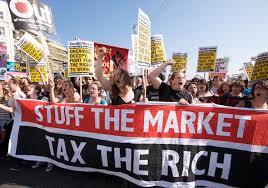Being remarkably poor for someone of my (IMHO) immense talents, I am no defender of the rich. And I deplore the way we have all been fleeced by a cabal of greedy, self-serving politicians, bureaucrats, business bosses and bankers. Hence I’ve written books like FLEECED and GREED UNLMITED exposing the way we’ve been exploited under the system of corrupt crony capitalism that both New Labour and Tories have encouraged.
As it looks increasingly likely that next week we’ll have a minority Labour government, kept in power by a (laughably named) “progressive” alliance of SNP and LibDems, we can be pretty certain that a major policy is going to be “let’s squeeze the rich”. And maybe that’s something that a lot of people who aren’t rich would welcome.
But let’s not cheer too prematurely. I’ve tried to write a little story which suggests that, however much we may all want to “squeeze the rich till the pips squeak”, a policy, that seems morally right after the way the rich have got richer while the rest of us have got poorer since the financial crash, may have unfortunate side effects for most of the rest of us:
Suppose that every week, ten men go out for beer and the bill for all�ten comes to �100. If they paid their bill the way we pay our taxes, it�would go something like this�
The first four men (the poorest) would pay nothing. The fifth would�pay �1. The sixth would pay �3. The seventh would pay �7. The eighth�would pay �12. The ninth would pay �18. The tenth man (the richest)�would pay �59.
But then the Government put a 20% tax on beer. So now the men would have to pay �120.
The first four men (the poorest) would still pay nothing. The fifth would�pay �1.20. The sixth would pay �3.60. The seventh would pay �8.40. The eighth�would pay �14.40. The ninth would pay �21.60. The tenth man (the richest)�would pay �70.80
But the richest man sat down for a moment, thought about things then decided he didn�t want to go to the pub any more. That left the nine others with a bill for �108.
The four poorest men didn�t care that the richest man wasn�t coming any more as they would still get their beer free. So, even though the price of beer had gone up, it didn�t worry them. But the others were not quite so happy. The fifth man saw his bill rise from �1 to �2.63. The sixth now had to pay �7.90 � a big increase from the previous �3. The seventh was faced with a bill of �18.40 � significantly more than the �7 he paid previously. The eighth saw his contribution shoot up from �12 to �31.60. And the ninth almost had a heart attack when he was faced with a bill of �47.41 � an awful lot more than the �18 he had contributed before the richest man pulled out of the arrangement.
After the ninth man returned home that night and told his wife that he was now paying �47.41 instead of just �18, she suggested that he stop going to the pub and take up golf instead.
A week later, the remaining eight made their habitual pub visit. Their bill was now �96. The poorest four, of course, still paid nothing. But for the others that visit was not a happy experience. Man number five was now paying �4.17 compared to just �1 when there were ten men. Number six saw his share jump from �3 to �12.52. Number seven almost fell over in shock as he had to pay �29.22, over four times more than the �7 he had paid originally. As for man number eight, when he saw his bill rise from �12 to �50, he decided that he too no longer wished to go to the pub.
The following week, when they went for their beers, men number five, six and seven were so shocked at the size of their bill that they decided to stop going to the pub.
As for the four poorest men, who had been so enthusiastic about the richer men paying more, they now had nobody to pay for their beers.















Mr Craig there is one thing wrong with your story. You equate your tale with paying
taxes. The men stop going to the pub. How do you stop paying taxes? I have a teacher’s
pension, but my state pension is �133.70 per week. Put this alongside bankers’ bonuses,
M.P.’s expenses, the Lords �500.00 per day turn up money, the �20 million annual
income from the Duchy of Cornwall and you may understand why I do not like your
tale.
The wealthy stop paying taxes by either moving abroad or by feeling they’re paying too much and so moving their money into tax avoidance schemes. The more a government increases tax, the more (rich) people will be motivated to avoid tax. If there is a drop in the tax take from the wealthiest, those on a middle or even low income will find themselves being forced to make up the difference
So you are saying that all rich people will move abroad, and that the rich are not already
trying to avoid paying taxes?
You stop paying taxes either by reducing activity – you don’t invest in a new factory say or leaving the country.
If you have a teachers pension it’s about 70% funded by the government anyway. The 6.4% you contributed throughout most of your career will have paid for hardly any of it.